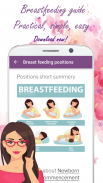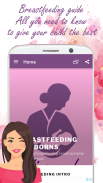





Breastfeeding Guide 🤱Breast pumping, Baby formula

Description of Breastfeeding Guide 🤱Breast pumping, Baby formula
Breastfeeding is an amazing miracle, however, it isn’t always easy at first, and there are many aspects and different alternatives that you should know in order to find the way that suits you best.
Usually planned parenthood includes breastfeeding. It is estimated that more than a million deaths of babies could be prevented globally per year through more widespread breastfeeding. Breastfeeding decreases the risk of respiratory tract infections and diarrhea.
In this mini-course we will teach you about the following:
👼 Breast milk - Not all of breast milk’s properties are understood, but its nutrient content
is relatively consistent. Breast milk is made from nutrients in the mother’s bloodstream and bodily stores. Breast milk has an optimal balance of fat, sugar, water, and protein that is needed for a baby’s growth and development.
👼 Breast feeding positions - Correct positioning and technique for latching on are necessary to prevent nipple soreness and allow the baby to obtain enough milk.
Babies can successfully latch on to the breast from multiple positions. Each baby may prefer a particular position. We will show you the different positions, pros and cons.
👼 Newborn feeding – Commencement and timing - Books like wonder weeks and videos advise mothers about breastfeeding. Lactation consultants in hospitals or private practice, and volunteer organizations of breastfeeding mothers such as La Leche League International also provide advice and support this is usually part of a planned parenthood.
👼 Breastfeeding methods:
Exclusive breastfeeding - Exclusive breastfeeding is defined as an infant’s consumption of human milk with no supplementation of any type (no water, no juice, no nonhuman milk and no foods) except for vitamins, minerals and medications.
Mixed feeding - Formula and pumped breast milk, side-by-side. Note that the formula is of uniform consistency and color, while the milk exhibits properties of an organic solution, separating into the creamline layer of fat at the top, milk and a watery blue layer at the bottom.
Predominant or mixed breastfeeding means feeding breast milk along with infant formula, baby food and even water, depending on the child’s age.
Expressed milk - A mother can “express” (produce) her milk for storage and later use. Expression occurs with a massage or a breast pump. It can be stored in freezer storage bags, containers made specifically for breast milk, a supplemental nursing system, or a bottle ready for use. Using someone other than the mother/wet nurse to deliver the bottle maintains the baby’s association of nursing with the mother/wet nurse and bottle feeding to other people.
👼 Health benefits for Babies - Early breastfeeding is associated with fewer nighttime feeding problems. Early skin-to-skin contact between mother and baby improves breastfeeding outcomes, increases cardio-respiratory stability and decreases infant crying.
👼 Health effects of breast feeding mom - Breastfeeding aids maternal physical and emotional health. Breastfeeding and depression in the mother are associated. Mothers who successfully breastfeed are less likely to develop postpartum depression.
👼 Disadvantages vs advantages of breastfeeding – Decision factors, part of planned parenthood is understanding all aspects of parenthood, breastfeeding is a major one,
👼 Breast Pumping - Breast pumping is usually needed if you like to go out to work or any other errands, and still feed breast milk to your baby. Here you’ll get are some tips and guidelines to help with breast pumping.
👼 Weaning off breastfeeding - Weaning is the process of replacing breast milk with other food. The infant is fully weaned after the replacement is complete.
Download now and learn how you can give the best for your baby!


























